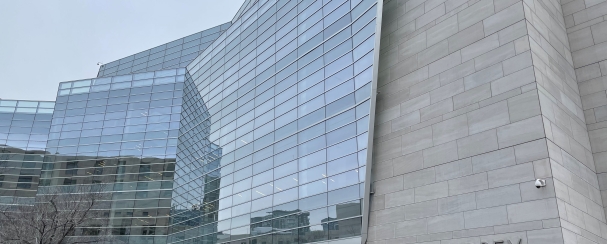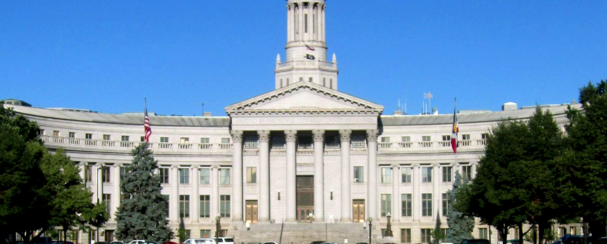About the Denver Probate Court
The Denver Probate Court, referred to as the 24th Judicial District, encompasses all of the City and County of Denver. The Colorado Constitution Article VI § 9(3) created the Denver Probate Court and defines its jurisdiction. The Probate Court has exclusive jurisdiction over "all matters of probate, settlements of estates of deceased persons, appointment of guardians, conservators and administrators, and settlement of their accounts, the adjudication of the mentally ill, and such other jurisdiction as may be provided by law." The Denver Probate Court also has jurisdiction over Extreme Risk Protection Order matters filed within Denver County.
Establishment of the Probate Court came as part of legislation that reorganized the state court system. Prior to that establishment, Probate, Juvenile and Mental Health cases were handled by justices of the peace as well as municipal and county courts. The legislation moved these case classes under district court's jurisdiction. David Brofman, who presided over Probate matters as a Denver County Judge since 1951, became the first Judge of Denver Probate Court in 1965.
Denver's Probate Presiding Judge, Elizabeth D. Leith is appointed by the Governor. Magistrate, Beth A. Tomerlin, is hired by the Presiding Judge.



Clerk's Office:
The Denver Probate Court does not accept pro se filings by fax or email. Pro se filings may be submitted in person or by mail to the address below.
1437 Bannock Street, Room 230
Denver, CO 80202
As you step off the elevator on the second floor, turn left. The Clerk's Office is at the end of the hall on the right.
303-606-2303
02DPCClerksOffice@judicial.state.co.us
Self-Help Center:
The Self-Help Center provides procedural and general probate information to parties not represented by an attorney. Pro Se assistance can be provided in person in Room 230, by telephone at (303) 606-2502 or by email at DPCSelfHelp@judicial.state.co.us.
1437 Bannock Street, Room 230
Denver, CO 80202
As you step off the elevator on the second floor, turn left. The Self-Help Center is located around the corner at the end of the hall. Please be aware that the self-help center line is separate from the clerk's office line.
Need legal advice? Sign up to speak with a volunteer attorney regarding your probate related matter. More information can be found in our Volunteer Attorney Clinic Flyer.
Forms and instructions for initiating a probate case are not specific to the Denver Probate Court and can be found on the Colorado Judicial Branch website.
Forms specific to the Denver Probate Court are as follows:
DPC 5 - Petition to Withdraw Funds from Restricted Registry Account
DPC 6 - Objection to Magistrate Hearing Case
DPC 8 - Decedent's Family Tree
Record Requests:
Records and search requests may be submitted in person, over the phone at 303-606-2303, by mail or by email sent to DenverProbateRecordsRequest@judicial.state.co.us. You may also submit your request using our online portal. Please include the following information where applicable: case number(s), party's name, date of death, date of birth, county of residence and documents being requested. Please note that the statewide index for records does not go further back than 1988. For records that were filed in counties other than Denver prior to 1988, please contact those counties directly. Please see below for a list of fees that may apply.
Search Request Fee: $5.00 per name search (will be required upfront if you do not know the case number you are requesting records from)
Copy Fee: $0.25 per page
Certification Fee: $20.00 each
Exemplification Fee: $20.00 each
Offsite Record Retrieval: $15.00 per case
Postage: $1.00 for 10 pages
Transcripts Requests can be made using the Transcript Request Form.
Digital Recording Requests can be made using the Digital Recording Request Form.
Guardianships and Conservatorships
Guardianships and Conservatorships
Conservatorships
A conservator is a person at least 21 years of age who is appointed by the court to manage the estate of a protected person. The respondent, the individual who is the subject of the proposed conservatorship, must reside in the county in which the petition is filed. If the respondent does not reside in Colorado, the petition may be filed in any county of this state in which property of the respondent is located. See Guardian and Conservator for additional information.
A conservator may be appointed for a minor if the court determines that the minor owns money or property requiring management or protection that cannot otherwise be provided or has or may have business affairs that may be put at risk or prevented because of the minor’s age, or that money is needed for support and education and that protection is necessary or desirable to obtain or provide money, pursuant to 15-14-401(1)(a) C.R.S.
A conservator may be appointed for any individual if they are unable to effectively receive or evaluate information or both or communicate decisions, even with the use of appropriate and reasonably available technological assistance, or because the individual is missing, detained or unable to return to the United States; and that individual has property that will dissipate unless management is provided or money is needed for support and that protection is necessary or desirable to obtain or provide money, pursuant to15-14-401(1)(b) C.R.S.
Guardianships
A guardian is a person at least 21 years of age who is appointed by the court to manage the welfare of a minor or incapacitated person. The respondent, the individual who is the subject of the guardianship, must reside or be located in the county in which the petition is filed. See Guardian and Conservator for additional information.
A guardian may be appointed for a minor under the age of 18, or under certain circumstances up to age 21, if it is in the minor’s best interest; and the parents’ consent, all rights have been terminated, the parents are unwilling or unable to exercise their rights, or a previously appointed third party guardian has subsequently died or become incapacitated and has not made an appointment of a guardian by will or written instrument pursuant to 15-14-204(2) C.R.S.
A guardian may be appointed for an adult if they are incapacitated and their needs cannot be met by less restrictive means, pursuant to 15-14-311 C.R.S. An incapacitated adult is one who is unable to effectively receive or evaluate information or both or make or communicate decisions to such an extent that the individual lacks the ability to satisfy essential requirements for physical health, safety, or self-care, even with the appropriate and reasonably available technological assistance.
Settlement of Claims
Settlement of Claims
A request for approval of a proposed settlement of claims on behalf of a minor or an adult in need of protection pursuant to C.R.S. 15-14-401 may be presented in accordance with Colorado Rules of Probate Procedure (C.R.P.P.) rule 62.
Estates and Trusts
Estates and Trusts
Estates
Intestate/Testate Proceeding
A request may be presented formally or informally to appoint a personal representative over a decedent’s estate for the purposes of administration. See Trust, Estates and Wills for additional information.
Special Administration
Pursuant to 15-12-614 C.R.S., an informal request may be presented to appoint a special administrator over a decedent’s estate to protect the estate prior to the appointment of a general personal representative, or if a prior appointment has been terminated. When it is necessary to preserve or secure proper administration, including circumstances where a general personal representative cannot or should not act, the request may be presented formally with notice. The formal appointment may be requested as an emergency without notice.
Determination of Heirs or Devisees or Both and Interests of Property
When a decedent leaves an interest in real property, any interested person or person who may be affected may petition the court to determine heirs and the descent of intestate property, or devisees under a will and the succession of testate property.
Release of Remains
A detailed request for release of remains may accompany a Petition for Determination of Heirs or a formal request for appointment of personal representative.
Release of DNA
The Denver Probate Court has exclusive jurisdiction to determine heirship for the purposes of inheritance and/or if the child is over the age of 21. The remains and/or blood spot card also must be in the custody of the Denver Office of the Medical Examiner in Denver County.
Wills
Wills may be deposited with the court prior to the death of the Testator for a fee. A deposited will may be withdrawn by the testator with valid photo ID or upon review of a notarized letter from the testator requesting withdrawal.
Wills may be lodged with the court after the death of the Testator pursuant to 15-11-516 C.R.S. Lodged wills are retained by the court. The court may consider a Motion for Release of a lodged will filed into an existing estate matter, once appointment and/or administration has concluded.
Trusts
Trust Registration
A trustee may register the trust in the principal place of administration pursuant to 15-5-205-207 C.R.S.
Trust Administration
A Petition may be presented to request the court’s intervention in the administration of a trust pursuant to 15-5-201 C.R.S.
Extreme Risk Protection Orders
Extreme Risk Protection Orders
Extreme Risk Protections Orders (also known as ERPOs and/or the Red Flag Law), were effective January 1, 2020, per Joint Order Regarding Administration of Actions Filed Pursuant to 13-14.5-101 C.R.S., all actions brought under 13-14.5-101 C.R.S. are to be filed with the Denver Probate Court. For statewide ERPO procedures and forms, see Extreme Risk Protection Orders.
Mental Health
Mental Health
Certification for Treatment:
- A person detained pursuant to 27-65-106 C.R.S. may be certified for treatment by a designated facility pursuant to 27-65-109 C.R.S.
Court Ordered Evaluation
- Any individual may petition the Court alleging that there is a person that appears to have a mental health disorder, and as a result is a danger to self, others or is gravely disabled, and request a court ordered evaluation of the person’s condition pursuant to 27-65-106 C.R.S.
- Any individual may petition the Court alleging that there is a person that appears to have a mental health disorder, and as a result is a danger to self, others or is gravely disabled, and request a court ordered evaluation of the person’s condition pursuant to 27-65-106 C.R.S.
Substance Use Disorder:
- A person may be committed to the custody of the Behavioral Health Administration upon petition alleging a substance use disorder and threatening or attempt to inflict physical harm or that the person is incapacitated by substances, pursuant to 27-81-112 C.R.S.
- A person may be committed to the custody of the Behavioral Health Administration upon petition alleging a substance use disorder and threatening or attempt to inflict physical harm or that the person is incapacitated by substances, pursuant to 27-81-112 C.R.S.
Information for Attorneys
Information for Attorneys
To be considered for Denver Probate Court-Appointed Counsel Appointments please see Policies and Procedures for additional details.
Denver Probate Court requires Attorney's to file electronically via the Colorado Court's E-Filing system. Should an attorney wish to submit pleadings in paper format, a fee of $50.00 per filing would apply. See the Amended Administrative Order Regarding Mandated E-Filing of Probate Cases for more information. For Attorney E-Filing Information please visit the Colorado Judicial Branch Website.
Community Resources
Community Resources
This list is published by the Denver Probate Court as a public service in compliance with Colorado Revised Statute §13-14.5-114 (2). The material presented is intended to be informational and should not be construed as an endorsement of any of the entities listed.
If you are seeking crisis intervention, mental health treatment, substance abuse treatment, or counseling, the following is a list of community resources available to all in the Denver Metro Area.
- 988 Suicide and Crisis Lifeline provides free and confidential emotional support to people in suicidal crisis or emotional distress 24 hours a day, 7 days a week, across the United States.
- Call or Text: 988
- Website: https://www.988lifeline.org
- Access-A-Ride is RTD’s ADA complementary paratransit service.
- Phone: (303) 299-6000
- Website: https://www.rtd-denver.com/routes-services/other-services/access-a-ride
- Angel Eyes is a Colorado non-profit organization that offers free professional grief support to families that have been impacted by pregnancy loss or the unexpected death of an infant or toddler.
- Phone: (303) 320-7771
- Address: 422 21st Street, Units 4 and 5, Denver, CO 80205
- Email: info@angeleyes.org
- Website: angeleyes.org
- Behavioral Health Administration (BHA) is the state administration responsible for ensuring all people in Colorado have access to quality mental health and substance use disorder services, regardless of where they live, or ability to pay.
- General Inquiries Phone Number: (303) 866-7400
- General Inquiries Email: cdhs_bha@state.co.us
- Involuntary Commitment Phone Number: (303) 866-7502
- Involuntary Commitment Email: cdhs_obhsubstance_ic@state.co.us
- Address: 710 S. Ash Street Denver, CO 80246
- Website: bha.colorado.gov
- Bereavement Support Group for Men (Widowers) is a support group for men who have lost spouses.
- Phone: (303) 776-8203
- Address: Longmont Senior Center, 910 Longs Peak Avenue, Longmont, CO 80501
- The Center for Trauma and Resilience is dedicated to offering culturally and linguistically responsive services and to fostering health promotion for people affected by crime and trauma.
- Phone: (303) 894-8000
- Website: traumahealth.org
- Colorado Access connects members to care across various health services, including Health First Colorado (Colorado’s Medicaid program), physical and behavioral health, and Child Health Plan Plus (CHP+).
- Phone: (800) 511-5010
- Address: 11100 East Bethany Drive, Aurora, CO 80014
- Email: customer.service@coaccess.com
- Website: coaccess.com
- The Colorado Coalition for the Homeless works collaboratively toward the prevention of homelessness and the creation of lasting solutions for families, children, and individuals who are experiencing or at-risk of homelessness throughout Colorado.
- Phone: (303) 293-2217
- Email: info@coloradocoalition.org
- Address: 2111 Champa Street, Denver, CO 80205
- Website: coloradocoalition.org
- Colorado Crisis Services is Colorado’s statewide resource for mental health, substance use, or emotional crisis help, information, and referrals.
- Crisis Line Phone Number: 1-844-493-TALK (8255)
- Text: TALK to 38255
- Address: 4353 East Colfax Avenue, Denver, CO 80220
- Website: coloradocrisisservices.org
- The Colorado ID Project is designed to assist low-income, disabled, homeless and elderly Coloradans seeking documentation of their identity, immigration, or citizenship status.
- Phone: (303) 837-1313
- Address: 1905 Sherman Street, #400, Denver, Colorado 80203
- Email: idproject@colegalserv.org
- Website: coloradoidproject.wordpress.com
- Colorado Veterans Project mainly focuses on special events and raising awareness and funds for Veterans, but they also have a large network of resources and connections in the Veteran and Military community.
- Phone: (303) 263-8160
- Email: Info@ColoradoVeteransProject.org
- Website: coloradoveteransproject.org
- Denver Children’s Advocacy Center coordinates health and mental health care for child trauma victims and their non-offending family members.
- Phone: (303) 825-3850
- Address: 2149 Federal Blvd, Denver, CO 80211
- Email: info@denvercac.org
- Website: denvercac.org
- The Denver ELEMENT is a program of Mile High Behavioral Healthcare serving the LGBTQ+ communities of Denver.
- Phone: (720)382-5900
- Address: 4242 Delaware Street, Denver, CO 80216
- Website: denverelement.org
- Denver Health provides all in our community with access to the highest quality and equitable health care regardless of their ability to pay.
- Phone: (303) 436 – 6000
- Address: 777 Bannock Street, Denver, CO 80204
- Website: denverhealth.org
- Denver Human Services employees help children, older adults, families, and individuals navigate social and economic pressures by connecting them to services and experts who support their overall well-being.
- General Inquiries Phone Number: 720-944-4DHS (4347)
- To Report Suspected Child Abuse or Neglect in Denver County: (720) 944-3000
- To Report Suspected Child Abuse or Neglect Outside Denver County: 1-844-CO-4-KIDS (1-844-264-5437).
- To Report Suspected Abuse and Neglect of Older At-Risk Adults: (720) 944-3000
- Address: 1200 N. Federal Boulevard, Second Floor Entrance, Denver, CO 80204
- Website: https://www.denvergov.org/Government/Agencies-Departments-Offices/Agencies-Departments-Offices-Directory/Denver-Human-Services
- Denver Indian Health and Family Services, Inc. (DIHFS) is an Urban Indian Health Program providing services to the American Indian/Alaska Native (AI/AN) community.
- Phone: (303)-953-6600
- Address: 2880 West Holden Place, Denver CO, 80204
- Website: dihfs.org
- Denver Police Department Victim Assistance Unit provides crisis intervention services, support, information and advocacy to victims, witnesses and family members in the event of criminal victimization or in certain instances of non-criminal stark misfortune.
- Phone Number: (720) 913-6035
- Address: 1331 Cherokee Street, Denver, CO 80204
- Website: denvergov.org/Government/Agencies-Departments-Offices/Agencies-Departments-Offices-Directory/Police-Department/Programs-Services/Victim-Services
- Denver Rescue Mission helps restore the lives of people experiencing homelessness and addiction through emergency services, rehabilitation, transitional programs, and community outreach.
- Phone: (303) 294-0157
- Address: 1130 Park Avenue West, Denver, CO 80205
- Website: denverrescuemission.org
- Denver Temporary Rental and Utility Assistance (TRUA) can help eligible households with rent for up to six nonconsecutive months (including arrears, current rent, and up to one future month) per calendar year; relocation assistance, including security deposit, first month’s rent and application fees; and, help both renters and homeowners with utility assistance (Denver Water, Xcel Energy).
- El Centro de las Familias is a multicultural clinic providing bilingual (Spanish and English) mental health services to adults, youth, children and families from the Latino/a/x and Hispanic community.
- Phone: (303) 504-1900
- Address: 1405 N. Federal Boulevard, Denver, CO 80204
- Website: www.wellpower.org/el-centro-de-las-familias-english
- Food Bank of the Rockies is the largest hunger-relief organization in the Rocky Mountain region. Their services include a mobile pantry program, children’s programs for after school and summer meals, meals for low-income seniors and other individuals, as well as commodity food boxes.
- Phone: (303) 371-9250
- Address: 10700 E. 45th Avenue, Denver, CO 80239
- Website: foodbankrockies.org
- HeartLight Center provides meaningful and accessible grief support and education to the community.
- Phone: (720) 748-9908
- Address: 11150 E. Dartmouth Avenue, Aurora, CO 80014
- Website: heartlightcenter.org
- Hunger Free Colorado connects people to food resources to meet existing needs.
- General Inquiries Phone Number: (720) 328-1284
- Food Resource Hotline: 855-855-4626
- Website: hungerfreecolorado.org
- IDEA Denver offers substance abuse, domestic violence, and behavioral therapy services.
- Phone: (303) 477-8280
- Address: 2370 W Alameda Avenue #8, Denver, CO 80223
- Website: ideacares.com
- Jewish Family Service is a nonprofit human services organization that serves anyone in need – regardless of their circumstances or religious beliefs.
- Phone: (303) 597- 5000
- Address: 3201 South Tamarac Drive, Denver, CO 80231
- Website: jewishfamilyservice.org
- Judi’s House has facilitated support groups for children ages 3 to 18 who have experienced the death of a loved one.
- Phone: (720) 941-0331
- Address: 10125 E 25th Avenue, Aurora, CO 80010
- Website: judishouse.org
- Latina SafeHouse strives to provide bilingual and culturally sensitive services to Latina survivors of domestic violence and their families.
- Phone: (303) 433-4470
- Email: info@latinasafehouse.org
- Website: latinasafehouse.org
- Metro Caring works with the community to meet people's immediate needs for nutritious, culturally relevant foods.
- Phone: (303) 860-7200
- Address: 1100 E. 18th Avenue Denver, CO 80218
- Email: info@MetroCaring.org
- Website: metrocaring.org
- Mile High United Way is a non-profit charity organization in Metro Denver focused on affordable housing, basic needs, early childcare and development, and more.
- Phone: (303) 433-8383
- Address: 711 Park Avenue W, Denver, CO 80205
- Email: info@unitedwaydenver.org
- Website: unitedwaydenver.org
- People House is an inclusive spiritual organization that believes mental health care should be accessible to everyone from all cultural identities and socio-economic backgrounds.
- Phone: (303) 480-5130
- Address: 3035 W. 25th Avenue, Denver, CO 80211
- Email: info@peoplehouse.org
- Website: peoplehouse.org
- The Phoenix provides a sober active community that fuels resilience and harnesses the transformational power of connection.
- Phone: (720) 440-9175
- Address: 2233 Champa St, Denver, CO 80205
- Website: thephoenix.org
- Project Safeguard is a non-profit organization committed to helping end gender-based violence through safety planning, legal advocacy, direct court support and attorney services to victims of domestic violence, sexual assault, and stalking.
- Phone: (720) 618-3482
- Address:
- City and County Building, 1437 Bannock Street, Room 177, Denver, CO 80202
- Rose Andom Center, 1330 Fox Street, Denver, CO 80204
- Email: info@psghelps.org
- Website: psghelps.org
- Rocky Mountain Human Services is a nonprofit organization that offers person-centered case management and direct services to support the health, self-sufficiency, and overall quality of life for children, adults, and veterans in Colorado.
- Phone: (303) 636-5600
- Address: 9900 E. Iliff Avenue, Denver, CO 80231
- Email: questions@rmhumanservices.org
- Website: rmhumanservices.org
- The Rose Andom Center is a survivor-centered, trauma-informed collaborative that cultivates hope for individuals and families impacted by intimate partner abuse.
- Phone: (720) 337-4400
- Address: 1330 Fox Street Denver, CO 80204
- Email: info@roseandomcenter.org
- Website: roseandomcenter.org
- SafeHouse Denver is the only agency in the city and county of Denver that provides a full continuum of care to adults, children and youth experiencing domestic violence.
- Phone: (303) 318-9959
- Address: 1649 N Downing Street, Denver, CO 80218
- Website: safehouse-denver.org
- Servicios de la raza is a bilingual human services organization that serves Denver’s low-income Spanish-speaking populations with linguistically and culturally responsive social services, including treatment of mental health and chronic mental illnesses.
- Phone: (303) 548-5851
- Address: 3131 W.14th Ave Denver, CO 80204
- Website: serviciosdelaraza.org
- Substance Abuse and Mental Health Services Administration (SAMHSA) is the agency within the U.S. Department of Health and Human Services (HHS) that leads public health efforts to advance the behavioral health of the nation and to improve the lives of individuals living with mental and substance use disorders, and their families.
- General Inquiries Phone Number: 877-SAMHSA-7 (877-726-4727)
- General Inquiries Email: SAMHSAInfo@samhsa.hhs.gov
- Website: samhsa.gov
- Support Team Assisted Response (STAR) provides person-centric mobile crisis response to community members who are experiencing problems related to mental health, depression, poverty, homelessness, and/or substance use issues.
- Phone: (720) 913-STAR (7827).
- Website: www.wellpower.org/star-program
- Tepeyac Community Health Center provides affordable and accessible integrated medical, behavioral, and dental care for everyone in the community.
- Phone: (303) 458 – 5302
- Address: 2101 E 48th Ave, Denver, CO 80216
- Email: info@tepeyachealth.org
- Website: tepeyachealth.org
- The Veterans Crisis Line is a free, confidential resource for Veterans, even if they’re not enrolled in VA benefits or health care.
- Phone: 988 then press 1
- Text: 838255
- Chat Online: veteranscrisisline.net/get-help-now/chat/
- Website: veteranscrisisline.net
- WellPower (formerly Mental Health Center of Denver) provides treatment, prevention, outreach, and crisis services to children, families, and adults.
- Adult Resource Center Phone Number: (303) 504-6800
- Adult Resource Center Address: 1075 Galapago Street, Denver, CO 80204
- Family Resource Center Phone Number: (303) 504-1575
- Family Resource Center Address: 3101 West 14th Avenue, Denver, CO 80204
- Website: WellPower.org
- Young People in Recovery is a national nonprofit that provides peer recovery support services for youth and young adults in recovery—or who are seeking recovery—from substance use disorder.
- Phone: (720) 600-4977
- Address: 1415 Park Avenue West Denver, Colorado 80205
- Website: youngpeopleinrecovery.org
Helpful Links
Helpful Links
- Adult Protection Unit, Denver Department of Human Services
- Learn signs of abuse, neglect, exploitation
- Contact information for reporting suspected abuse
- Denver County Office of the Clerk and Recorder
- Records: real estate/deeds/titles, marriage/civil union license and more
- Denver Motor Vehicle
- Colorado Bar Association
- City and County of Denver
- Colorado Department of Public Health & Environment
- Birth and Death Certificates
- Denver Department of Public Health & Environment
- Birth and Death Certificates
- Office of Attorney Regulation Counsel
- Social Security Administration
- Internal Revenue Service (IRS)
- Colorado Department of the Treasury
- Unclaimed Funds
- Colorado Legal Services
NA
NA
Template Text
 Colorado Judicial Branch
Colorado Judicial Branch

